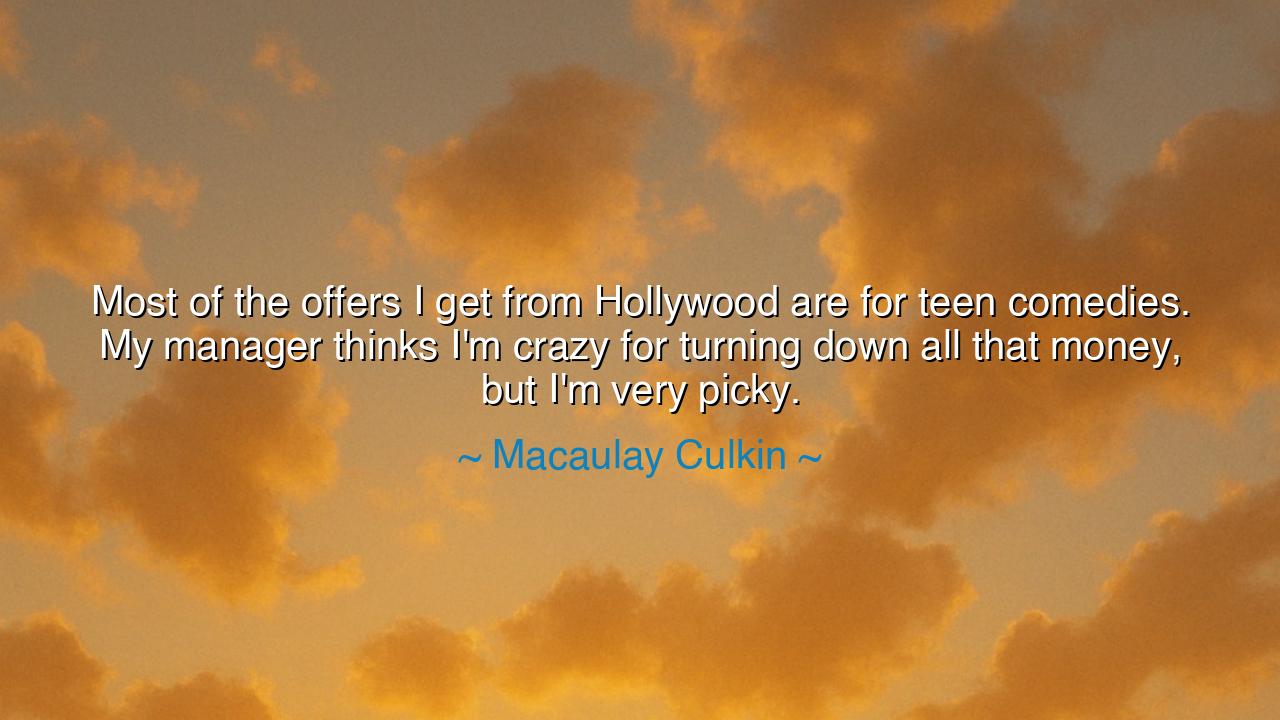
Most of the offers I get from Hollywood are for teen comedies.
Most of the offers I get from Hollywood are for teen comedies. My manager thinks I'm crazy for turning down all that money, but I'm very picky.






Hearken, children of the ages, to the words of Macaulay Culkin, who speaks of the delicate balance between art, ambition, and conscience: “Most of the offers I get from Hollywood are for teen comedies. My manager thinks I'm crazy for turning down all that money, but I'm very picky.” In these words lies the timeless struggle between fortune and integrity, between the lure of immediate gain and the pursuit of work that aligns with one’s true self and artistic vision. Culkin’s discernment reflects a courage that many are called to, yet few possess: the ability to value quality and meaning over convenience and wealth.
The origin of this reflection lies in Culkin’s life as a child actor, whose fame came swiftly and whose talents were recognized by the great machinery of Hollywood. Offers flowed like rivers, yet most were for teen comedies, a genre that, though popular and lucrative, did not satisfy his creative sensibilities. In choosing to decline these roles, Culkin demonstrates a principle as old as time: that not all opportunity is equal, and that alignment with one’s purpose is a measure more enduring than transient riches.
Consider the wisdom of the ancients, who taught that true value is discerned not in gold or applause, but in the cultivation of the self and the pursuit of excellence. Socrates, who resisted wealth and power in favor of truth, exemplifies this ethos. To refuse what is lucrative yet hollow is to honor one’s inner calling, to preserve the integrity of one’s craft, and to guard against the corruption of spirit that often accompanies unexamined acceptance.
History offers vivid parallels. Vincent van Gogh, largely unknown and materially impoverished during his lifetime, painted with relentless devotion to truth and vision, refusing to compromise for the fleeting comforts of approval or profit. His choice, though costly in worldly terms, cemented a legacy that outlives fortune itself. So too, Culkin’s picky selection of roles is an act of foresight: he invests in longevity, artistic integrity, and personal fulfillment, rather than the shallow lure of immediate gain.
This quote also illuminates the pressure of external expectation. Culkin’s manager, reflecting the worldly perspective, sees only the profit foregone, failing to perceive the deeper wisdom of choosing with discernment. Such tension between counsel and conscience is universal: mentors, society, and fortune often press for compliance, yet the courageous soul must navigate these waters guided by inner compass and moral clarity. The measure of a life well-lived is found not in the acceptance of every opportunity, but in the careful selection of those that resonate with purpose and meaning.
From Culkin’s reflection, a timeless lesson emerges: one must cultivate the discipline of selectivity, recognizing that integrity and alignment with one’s principles outweigh immediate reward. The temptations of wealth, fame, and ease are many, yet only those who remain faithful to their values secure the true satisfaction of the soul. History and human experience demonstrate that the cost of compromise is often hidden, and the benefits of patience and discernment endure far beyond fleeting applause.
Practical guidance flows from this ancient truth. First, define your values and purpose, so that every opportunity can be measured against them. Second, cultivate courage to decline what offers comfort or wealth but diminishes your vision. Third, seek mentors who respect, rather than override, your inner judgment. Fourth, recognize that patience and selectivity often yield greater fulfillment and legacy than immediate gain. Finally, honor your work as an extension of the self, and let your choices reflect wisdom, integrity, and deliberate intent.
Thus, let Macaulay Culkin’s words echo through the corridors of time: to be “picky” is not folly, but an act of heroic discernment. In a world eager to seduce with riches and ease, the soul that chooses with wisdom preserves its integrity, nurtures its art, and cultivates a legacy that endures. The lesson is eternal: true success lies not in what one accepts, but in what one chooses to honor with dedication, courage, and conscience.






AAdministratorAdministrator
Welcome, honored guests. Please leave a comment, we will respond soon